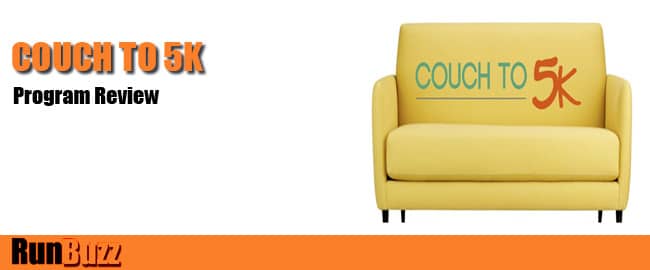Photo: Courtesy of seasonitalready.com
I’ll be honest. I am not a big fan of the Couch to 5K training program.
Let me explain why.
It’s not that it’s a bad program (it’s scientifically sound), but in my experience as a running coach, I feel it heavily favors and is geared towards younger people who generally recover and progress faster.
First of all, Couch to 5K is more of a calendar with some basic guidelines than a complete training program, as it only focuses on the activity of running itself. To me, a complete training program should also encompass other components, such as good nutrition, mindset or mental training, sound personal health habits, cross training, injury prevention techniques, and so on.
The perception created by “schedule-only” plans, like Couch to 5K, is that people think they can just follow a “schedule” and all of their running problems will be solved. That is far from reality.
But I’m a coach, so I must be biased, right? I mean after all, don’t I just want more coaching clients?
Actually, no. Read on to find out why.
What I Dislike About the Couch to 5K Program
Before I begin, know that I’m not coaching individual clients right now. I did at one time but am now focusing on sharing what I do with groups of people so they can be the best runners that they can be. I do this via my running club, podcasts, blog, Facebook page, etc. I have no vested interest in slamming another training plan that encourages people to take up a healthy lifestyle through running. I just want to offer what I feel is a fair review, since I am asked about this plan all the time!
Firstly, this plan is just a guide. Even when I make plans for my running club or for a client, these are just guides. If I wrote the perfect plan, mine would not necessarily be best for everyone and would need constant adjustment just to stay in sync with the individual response to the plan. Basically, all plans are geared towards a desired outcome for the individual or specific group the plan was designed for. However in almost every case, the plan needs tweaks and adjustments, as individuals progress to address specific issues.
Early on when I first started coaching, I used the Couch to 5K plan with several of my beginning runners. Some were successful, some were not. It was about a 50/50 split. I found older runners (say greater than 35-40 years of age) and overweight runners struggled with the plan. It’s my opinion that 9 weeks was too aggressive for most beginning runners. Sure, you may be able to do it and complete it, but what’s the point if you suffer through it or risk injury. (Note: The plan itself is not the issue with injury, but rather the person who is following the plan when it is not right for them)
Beginning runners often develop overuse injuries such as shin splints, achilles tendonitis, and a wide range of other issues. Not right at first, but in weeks 4 and onwards. Ideally, runners would spend several weeks walking, then transitioning to walk/jog methods, and then running over a longer period of time to allow the muscles and bones to adapt.
You see, it can take a few weeks for cardio levels to adapt, but it often takes 6-12 months for muscles and 12-24 for bones to fully adapt to new levels of exercise demand. The problem is that we feel great after a few weeks and want to push ourselves (which does not feel like pushing ourselves because our cardio has adapted). We end up injured, because our muscles and joints were not fully adapted. The more aggressive a plan is, the more likely this is to occur.
Because of this increased chance of injury, when working with new runners training for their first 5K, I no longer use a mileage approach. I instead use an interval based approach based on feel and progress that ramps up much more conservatively than many other programs. This has been highly successful and has had a near 100% success rate!
What I Like About the Couch to 5K Plan
The Couch to 5K plan is great for some runners.
Younger runners (<35 years of age) did well with the Couch to 5K schedule as did runners (all ages) who were coming back from a short or moderate break from running. This includes people who were pretty active leading up to the start of the program. In my opinion, this plan is a decent match if you fit within the following demographic:
- active people wanting to run a 5k
- younger runners (<35-40 years of age)
- experienced runners coming back from an extended layoff (e.g 6-12 months)
For this demographic, the plan provides great structure and is focused on running only 3 days per week, which is ideal for new runners, so they have time for rest and recovery from the workouts. It’s also realistic, from a time commitment perspective, as most people can reasonably get in 3 days of running per week. For that, I give it kudos!
Final thoughts
The Couch to 5K training calendar is a sound training approach. Tens of thousands of people have tried it and many have been successful, but certainly not everyone. When looking for a 5K training program, try to find out the rationale behind the plan, and just as importantly, continue to study the sport, learn the science behind training, and let your best judgment be the guide. Your body will always tell you (once you learn the signals) what you should be doing.
Have you had positive or negative experiences with the Couch to 5K training program?
Start/Join a discussion on the RunBuzz Facebook page.
Happy Running! Couch to 5K is a registered trademark of CoolRunning.com and Active.com. These thoughts are my opinion only based on my experience as a coach of 5k runners using this plan and what I have learned along the way. Your results and experience may differ (and that is OK).
- About the Author
- Latest Posts

Steve Carmichael is a running coach, sports performance coach, nutrition coach and has been a recreational runner for over 18 years. Steve holds multiple certifications as a certified running coach through the RRCA and USA Track and Field as well as he is a NASM certified personal trainer, and PN1-L1 certified nutrition coach.
Steve has been coaching since 2010 and has helped thousands of runners online and in the Central Ohio area maximize performance and run injury-free.
Steve is the founder of RunBuzz and Run For Performance.com. If you are interested in working with Steve though his online running and strength coaching services, feel free to reach out.

